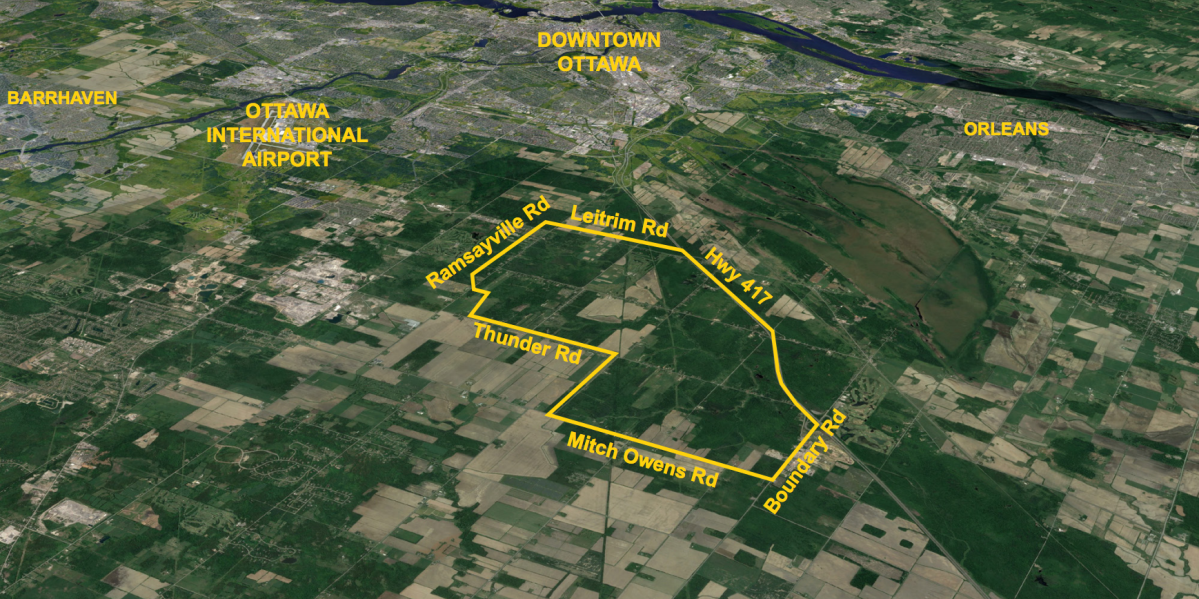A recent decision at city hall to carve out a section of Ottawa’s urban boundary expansion for a proposed development backed by the Algonquins of Ontario has some First Nations leaders upset over claims the land decision constitutes reconciliation.

The controversy started at last week’s joint meeting of the planning and rural affairs committee, where councillors and delegations debated for hours over multiple days about which land should be added to Ottawa’s urban boundary — the line that divides the city’s agricultural land from future housing stock.
The city voted last spring to expand Ottawa’s urban boundary by 1,300 hectares; the latest deliberations are determining where those hectares are placed.
The controversy came after a proposal to remove a plot of land recommended by city staff and a subsequent motion to instead carve out 445 hectares for a proposed community from the Algonquins of Ontario and their development partner, Taggart Group.
The proposal, dubbed Tewin, could eventually add 19,000 housing units to the area near Highway 417 and Amazon’s distribution centre on Boundary Road. But staff hadn’t scored the plot of land highly due to issues such as its poor transit connectivity and infrastructure costs associated with the development.
Beacon Hill-Cyrville Coun. Tim Tierney called Tewin an opportunity to “create a sustainable community from scratch” and to put Ottawa “on the map” when it comes to truth and reconciliation.
The motion to include the Tewin lands passed with a vote of nine to three.
- Poilievre calls Trump’s Canada attacks ‘wrong,’ urges U.S. trade stability
- Liberals survive confidence vote as House passes budget implementation bill
- Alberta budget 2026 comes with spending hikes but $9.4B deficit
- Liberal, Bloc Québécois rematch in Terrebonne riding after Supreme Court nixes result
But claims of reconciliation fall flat to some First Nations chiefs, who have sent letters to the city and Mayor Jim Watson expressing their disappointment with the decision.
Grand Chief Verna Polson of the Algonquin Anishinabeg Nation Tribal Council and Kitigan Zibi Anishinabeg Chief Dylan Whiteduck both sent letters to Watson on Thursday to object to the decision-making around the Tewin project.
Both letters chided the city for not consulting with the 10 recognized Algonquin First Nations groups on decisions pertaining to traditional Algonquin Anishinabeg land, which has never been formally ceded in treaty negotiations.
The chiefs also called into question the legitimacy of the Algonquins of Ontario to speak for and negotiate on behalf of other First Nations groups. Both wrote in their letters that the Algonquins of Ontario are not recognized as majority First Nations by other communities.
“It’s quite alarming,” Whiteduck said of the committee’s actions in an interview with Global News on Thursday.

Get breaking National news
“They have to be educated on this. They have to understand what they’re getting themselves into,” he said of city council, which will vote on the committee’s recommendations at the upcoming meeting on Feb. 10.

The Algonquins of Ontario represent 10 communities in an ongoing land claim settlement with the provincial and federal governments.
Lynn Clouther, an Algonquin negotiation representative for Ottawa, said in a statement to Global News that it was “disheartening” to see “inaccurate statements” from First Nations leaders in Quebec. Whiteduck noted to Global News that the Ontario River is not considered an accepted border for Algonquin Anishinabeg lands.
Clouthier backed up the legitimacy of the Algonquins of Ontario by stating that members must satisfy “rigorous enrolment criteria” to participate in treaty negotiations with the provincial and federal governments.
“Tewin was purchased at fair market value, outside of our treaty negotiations, and is a true opportunity to advance the historical, cultural and economic development goals of the Algonquins, and in doing so strengthen the social, economic and cultural fabric of the City of Ottawa,” she said in conclusion.
Watson, who has publicly backed including the Tewin proposal in Ottawa’s urban boundary expansion, also deferred to the provincial and federal government’s authority on recognizing the Algonquins of Ontario’s legitimacy.

“To them, this is a meaningful reconciliation opportunity, and they now look to the City of Ottawa to unlock the economic development benefits that will stem from these lands. Without city council’s support, they cannot unlock and share in the prosperity that can be generated from the development of the Tewin lands,” Watson said in a statement through his press secretary.
“Algonquin leaders like Chief Wendy Jocko of Pikwakanagan support the Tewin proposal. It is not the role of Ottawa’s city council to adjudicate internal disputes between Algonquin communities,” Watson said, alluding to an op-ed published in the Ottawa Citizen on Thursday outlining the Algonquins of Ontario’s position on Tewin.
But Whiteduck says reconciliation has become a buzzword for politicians to slap onto negotiations without doing the work needed to back up that claim. He says moves such as naming streets and bridges after Algonquin leaders is nice, but it doesn’t get to the core issues needed to build lasting relationships with Indigenous communities.
“That’s not the groundwork of what reconciliation is all about,” he says. “It’s a tool now that some cities use to say that it is reconciliation. They use it for their beneficial purposes.”
The quick turnaround from the Jan. 26 committee vote and the upcoming Feb. 10 council meeting should raise “red flags” on the Tewin project, Whiteduck says.
He and other First Nations leaders have said they are ready for consultation before the upcoming final vote, but he otherwise suggests the decision should be delayed until a proper dialogue has formed.
If the mayor’s mind is made up on the decision, Whiteduck encourages other councillors to reach out and do the research needed before Wednesday’s meeting.
“He’s one vote. I think the councillors of the City of Ottawa have to make an informed decision here. They hold the power to deal with this,” he says.
“The city decides whether reconciliation is dead or not.”









Comments
Want to discuss? Please read our Commenting Policy first.